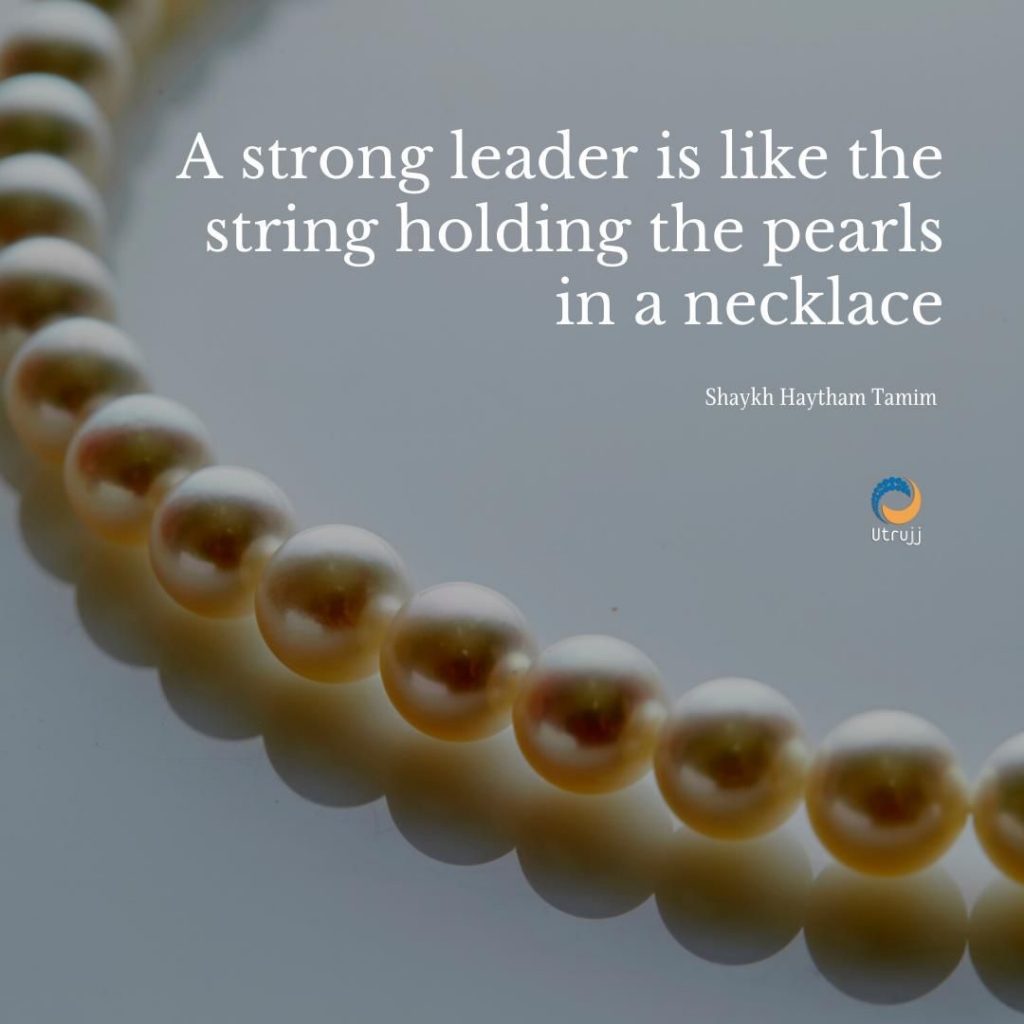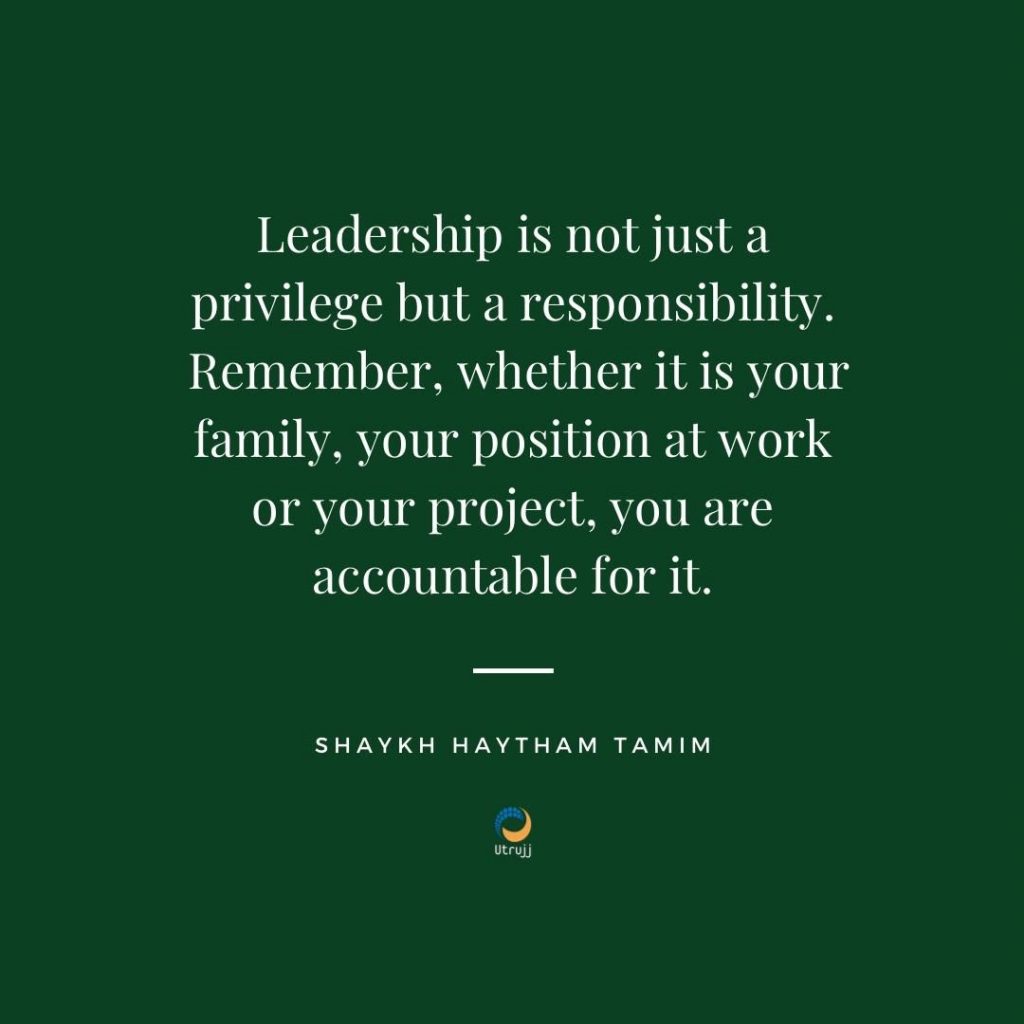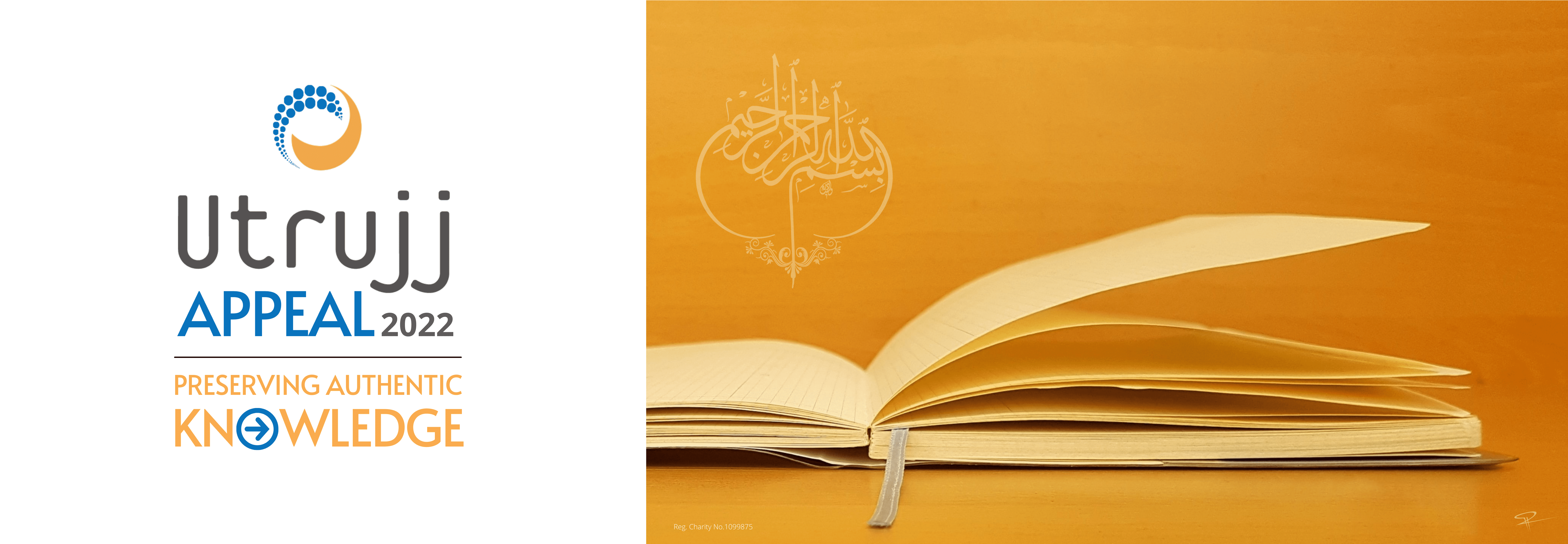Dhul Qarnayn and the qualities of the ideal leader

In Surat al Kahf Allah mentioned four stories and one of them is the story of Dhul Qarnayn.
Why does Allah Almighty tell us about Dhul Qarnayn?
The story of Dhul Qarnayn appears in Surat al Kahf and is an answer to one of the three questions posed by Quraysh to the Prophet (peace be on him) to challenge whether he was truly the Messenger of God or not.
They had sent a delegation from Makkah to Yathrib to ask the Jewish Rabbis to give them some questions which would throw him, and thereby disprove that he was a prophet. These questions were what is the nature of the soul, which Allah Almighty answered in Surat al Isra. They asked him about the People of the Cave, which forms the first story of Surat al Kahf, from which it takes its name. The last question was the story of the ruler who used to travel on great expeditions. The revelation came with information about Dhul Qarnyan, who was a great leader, which Allah outlined in 14 verses in the Quran.
وَيَسۡـئَلُوۡنَكَ عَنۡ ذِى الۡقَرۡنَيۡنِ ؕ قُلۡ سَاَ تۡلُوۡا عَلَيۡكُمۡ مِّنۡهُ ذِكۡرًا ؕ
(O Muhammad), they ask you about Dhu al-Qarnayn. Say: “I will give you an account of him.” (18:83)
Who was Dhul Qarnayn?
Dhul Qarnayn means in Arabic: the one with two horns.
There are various conjectures among scholars of Tafsir about who he was, and some have suggested that he was Alexander the Great (died 323BC) who used to wear helmet with two horns, originated in Macedonia, was tutored by Aristotle and went on to conquer the eastern Mediterranean, Egypt, the Middle East, and parts of Asia in a remarkably short period of time. However this cannot be correct as Dhul Qarnayn was a righteous believer, who worshipped Allah, and a just ruler whereas Alexander was a pagan and could not be described as just.
The scholar, Tahir bin Ashur surmised that the meaning of Dhul Qarnayn is not necessarily two horns, but in Arabic it’s two plaits. and this was common in the kings of China, besides and he built a great dam, and this was in China due the fact that Dhul Qarnayn means the one with the two plaits (qarn) and so he connected this with the Chinese and he said this should be a king from China, religious and just. He was alive year 247 BC. However this is a unique opinion, which no one else has held, so we can also park this to one side.
In reality we do not know the identity of Dhul Qarnayn, except he was a great conqueror whose conquests might have spread from the east to the west and the north or to the south.
The attributes of a great leader
What makes Dhul Qarnayn an ideal leader? Foremost he was a person of strong faith and devotion. He is a just ruler who is very connected to the people. He understands the reality and shows perseverance and loyalty, as well as being a good communicator and truthful. Sadly it has become commonplace for our modern leaders to be serial liars, but this is not the way of the Quranic leader.
In the first few ayahs, Allah establishes that Dhul Qarnayn is powerful and just.
Powerful
اِنَّا مَكَّنَّا لَهٗ فِى الۡاَرۡضِ وَاٰتَيۡنٰهُ مِنۡ كُلِّ شَىۡءٍ سَبَبًا ۙ
We granted him power in the land and endowed him with all kinds of resources. (18:84)
Having established that Dhul Qarnayn was tremendously powerful, a quality that is often associated with corruption, Allah Almighty shows us that he is just.
Just
فَاَ تۡبَعَ سَبَبًا
He set out (westwards) on an expedition, (18:85)
حَتّٰٓى اِذَا بَلَغَ مَغۡرِبَ الشَّمۡسِ وَجَدَهَا تَغۡرُبُ فِىۡ عَيۡنٍ حَمِئَةٍ وَّوَجَدَ عِنۡدَهَا قَوۡمًا ؕ قُلۡنَا يٰذَا الۡقَرۡنَيۡنِ اِمَّاۤ اَنۡ تُعَذِّبَ وَاِمَّاۤ اَنۡ تَتَّخِذَ فِيۡهِمۡ حُسۡنًا
until when he reached the very limits where the sun sets, he saw it setting in dark turbid waters; and nearby he met a people. We said: “O Dhu al-Qarnayn, you have the power to punish or to treat them with kindness.” (18:86)
These people were utterly at his mercy, and he has the option either to behave unjustly towards them or to treat them generously. He chooses to treat them fairly. He is strict with criminals and gentle towards the good:
قَالَ اَمَّا مَنۡ ظَلَمَ فَسَوۡفَ نُعَذِّبُهٗ ثُمَّ يُرَدُّ اِلٰى رَبِّهٖ فَيُعَذِّبُهٗ عَذَابًا نُّكۡرًا
He said: “We will chastise him who does wrong, where after he will be returned to his Lord and He will chastise him grievously. (18:87)
وَاَمَّا مَنۡ اٰمَنَ وَعَمِلَ صَالِحًـا فَلَهٗ جَزَآءَ ۨالۡحُسۡنٰى ۚ وَسَنَقُوۡلُ لَهٗ مِنۡ اَمۡرِنَا يُسۡرًا ؕ
But as for him who believes and acts righteously, his will be a goodly reward and we shall enjoin upon him only mild commands.” (18:88)
Dealing with challenges and corruption
Out of his many expeditions and feats, Allah Almighty chooses to highlight the magnificent way in which he deals with the Yajuj (Gog) and Majuj (Magog). Dhul Qarnayn, on one expedition, reached a faraway land, where people were suffering from the evil being spread by the Yajuj and Majuj . They offer to pay him to save them, but rather than take payment, he collaborates with them to build a wall of iron to block them.
قالُوۡا يٰذَا الۡقَرۡنَيۡنِ اِنَّ يَاۡجُوۡجَ وَمَاۡجُوۡجَ مُفۡسِدُوۡنَ فِى الۡاَرۡضِ فَهَلۡ نَجۡعَلُ لَكَ خَرۡجًا عَلٰٓى اَنۡ تَجۡعَلَ بَيۡنَـنَا وَبَيۡنَهُمۡ سَدًّا
They said: “O Dhu al-Qarnayn, Gog and Magog are spreading corruption in this land. So shall we pay you taxes on the understanding that you will set up a barrier between us and them?” (18:94)
قَالَ مَا مَكَّنِّىۡ فِيۡهِ رَبِّىۡ خَيۡرٌ فَاَعِيۡنُوۡنِىۡ بِقُوَّةٍ اَجۡعَلۡ بَيۡنَكُمۡ وَبَيۡنَهُمۡ رَدۡمًا ۙ
He answered: “Whatever my Lord has granted me is good enough. But help me with your labour and I will erect a rampart between you and them. (18:95)
اٰتُوۡنِىۡ زُبَرَ الۡحَدِيۡدِ ؕ حَتّٰٓى اِذَا سَاوٰى بَيۡنَ الصَّدَفَيۡنِ قَالَ انْـفُخُوۡا ؕ حَتّٰٓى اِذَا جَعَلَهٗ نَارًا ۙ قَالَ اٰتُوۡنِىۡۤ اُفۡرِغۡ عَلَيۡهِ قِطۡرًا ؕ
Bring me ingots of iron.” Then after he had filled up the space between the two mountain-sides, he said: “(Light a fire) and ply bellows.” When he had made it (red like) fire, he said: “Bring me molten copper which I may pour on it.” (18:96)
فَمَا اسۡطَاعُوۡۤا اَنۡ يَّظۡهَرُوۡهُ وَمَا اسۡتَطَاعُوۡا لَهٗ نَـقۡبًا
Such was the rampart that Gog and Magog could not scale, nor could they pierce it. (18:97)

Gratitude towards Allah
Ultimately Dhul Qarnayn succeeds in saving them, and erecting the barrier and thanks Allah for His support.
قَالَ هٰذَا رَحۡمَةٌ مِّنۡ رَّبِّىۡ ۚ فَاِذَا جَآءَ وَعۡدُ رَبِّىۡ جَعَلَهٗ دَكَّآءَ ۚ وَكَانَ وَعۡدُ رَبِّىۡ حَقًّا ؕ
Dhu al-Qarnayn said: “This is a mercy from my Lord: but when the time of my Lord’s promise shall come, He will level the rampart with the ground. My Lord’s promise always comes true.” (18:98)

The 33 qualities in the story of Dhul Qarnayn
When I looked closely at these 14 verses I identified 33 attributes which Dhul Qarnayn make inspirational.
With Allah
- Strong relationship with Allah
- Deep Faith in Allah
- Deep trust in Allah
- Thinks well of Allah
- Devotion to Allah
- Commitment to Allah’s command
- Harnesses what Allah has given to do what pleases Him
- Gratitude for blessings
Personal qualities, dealing with people and projects
- Courageous
- Proud
- Knowledgeable
- Works to perfection
- Abstinent
- Powerful
- Humble
- Just
- Generous
- Loves people
- Cooperates
- Motivational
- Empowers others
- Trustworthy
- Easy going
- Tolerant
- Promotes goodness
- Ensures people’s safety
- Honest with God and with people (truthful)
- Good at communicating and understanding people
- Consults others and team player
- Takes care of people’s interest
- Makes sacrifices for the greater good
- Understands the reality and requirements of each stage
- Active in doing what is required
What is the lesson for us in the story of Dhul Qarnayn?
We are all responsible in our lives in various capacities and hold positions of authority. We are accountable to Allah for how we fulfil the trust He placed in us. Anas (may Allah be pleased with him) narrated that the Prophet ﷺ said:
عن أنس رضي الله عنه أن رسول الله صلى الله عليه وسلم قال: ((إن الله سائل كل راع عما استرعاه, حفظ أم ضيع؟ حتى يُسأل الرجل عن أهل بيته)). رواه النسائي وابن حبان.
‘Indeed Allah will question everyone who is responsible about his charge: has he fulfilled the Amanah or lost it. (Nasa’i and Ibn Hibban)
عَنْ عَبْدِ اللَّهِ بْنِ عُمَرَ يَقُولُ: سَمِعْتُ رَسُولَ اللَّهِ صَلَّى اللَّه عَلَيْهِ وَسَلَّمَ يَقُولُ:
((كُلُّكُمْ رَاعٍ وَكُلُّكُمْ مَسْؤول عَنْ رَعِيَّتِهِ، الإِمَامُ رَاعٍ وَمَسْؤولٌ عَنْ رَعِيَّتِهِ، وَالرَّجُلُ رَاعٍ فِي أَهْلِهِ وَهُوَ مَسْؤولٌ عَنْ رَعِيَّتِهِ، وَالْمَرْأَةُ رَاعِيَةٌ فِي بَيْتِ زَوْجِهَا وَمَسْؤولَةٌ عَنْ رَعِيَّتِهَا، وَالْخَادِمُ رَاعٍ فِي مَالِ سَيِّدِهِ ومَسْؤولٌ عَنْ رَعِيَّتِهِ، -قَالَ: وَحَسِبْتُ أَنْ قَدْ قَالَ: وَالرَّجُلُ رَاعٍ فِي مَالِ أَبِيهِ وَمَسْؤولٌ عَنْ رَعِيَّتِهِ- وَكُلُّكُمْ رَاعٍ وَمَسْؤولٌ عَنْ رَعِيَّتِهِ))متفق عليه.
Ibn ‘Umar (may Allah be pleased with them) reported:
I heard Messenger of Allah ﷺ saying:
All of you are guardians and are responsible for your wards. The ruler is a guardian and responsible for his subjects; the man is a guardian and responsible for his family; the woman is a guardian and is responsible for her husband’s house and his offspring; and so all of you are guardians and are responsible for your wards. (Bukhari and Muslim)
We ask Allah to make us Quranic leaders in our households and communities. Ameen

Shaykh Haytham Tamim – Khutbah 4th February 2022
Related posts
Inspirational leaders in Islam
When scholars and leaders fail
The greatness of Muhammad (peace be on him)
Learn optimism from the Prophet (peace be on him)
- The truth is more powerful than lies
- Does a bride’s wali have to be Muslim?
- Is is permissible to lead a salah split over different rooms?
- Global IT outage. When systems go down…
- The concept of worship. What are ibadah and ihsan – and how do they lead to self development?

Recommended Posts

The truth is more powerful than lies
July 26, 2024

Global IT outage. When systems go down…
July 19, 2024

